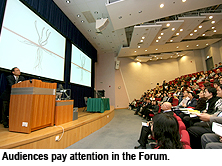Who we are in a globalised world
Craig Francis
City University of Hong Kong (CityU) lives by the mantra that its students become well-rounded professionals and through the General Education (GE) courses broaden their horizons and increase their appreciation of cultural diversity. The course, "GE2201 Identity and Citizenship in a Globalised World", is well tailored
to fulfil that mission.The course aims to engage students in learning and debates about rights and duties that come with citizenship, both at the local level and in non-local contexts (national, trans-national, global). The course also delves deeper to examine 'identities', which are more complicated than citizenship.
It raises some interesting questions along the way. How are 'identity' and 'citizenship' related? How do 'identity' and 'citizenship' affect our loyalties and our obligations? How do we reconcile conflicting identities, and act as responsible citizens? The course also deals with problems of citizenship and identity in the contemporary world, such as: ethnic and religious identities versus national identities, 'patriotic' education versus 'liberal' education, economic migrants and their contested rights and duties in many societies, and environmental impacts of our societies, and how these impacts may affect our rights and duties as 'citizens of the world'.
Dr Graeme Lang, Head of the Department of Asian and International Studies, said students will be able to analyse some of the many problems and conflicts related to identity and citizenship in the contemporary world.
"They will understand how identities are formed and how they change. They will explore competing and conflicting identities and discuss how such conflicts can be resolved. They will also discuss ideas about 'responsible citizenship' and be able to outline activities that can lead to responsible personal and corporate citizenship," explained Dr Lang.
The course's major learning activities will revolve around lectures, guest lectures, readings, web-based discussions, small-group discussions and off-campus interviews.
"Teaching and learning activities will stress discussion, exploration and the development of students' views and plans for their own 'citizenship' activities," said Dr Lang. "There will be less 'didactic' content than in many non-GE courses."When it comes to assessment, quizzes encouraging students to review and retain concepts and ideas presented in lectures will be worth 30%. But most of the assessment will focus on students' own explorations of these issues through a term paper (30%), short reflective assignment (15%) and participation in group activities such as presentations and group discussions (25%).
The course will be worth three credits and comprise about three hours of classroom activity per week.
In addition to "Identity and Citizenship in a Globalised World", CityU will offer five other GE courses in the second semester of 2007-08, including "Chinese Cultural Heritage in Modern Perspective", "Science and Technology: From Past to Future", "Information Management and its Social Impact", "Rational Thinking and Creative Ideas", and "Cinema: East and West".
For more details on GE courses, please visit http://vpue.cityu.edu.hk/ge/

